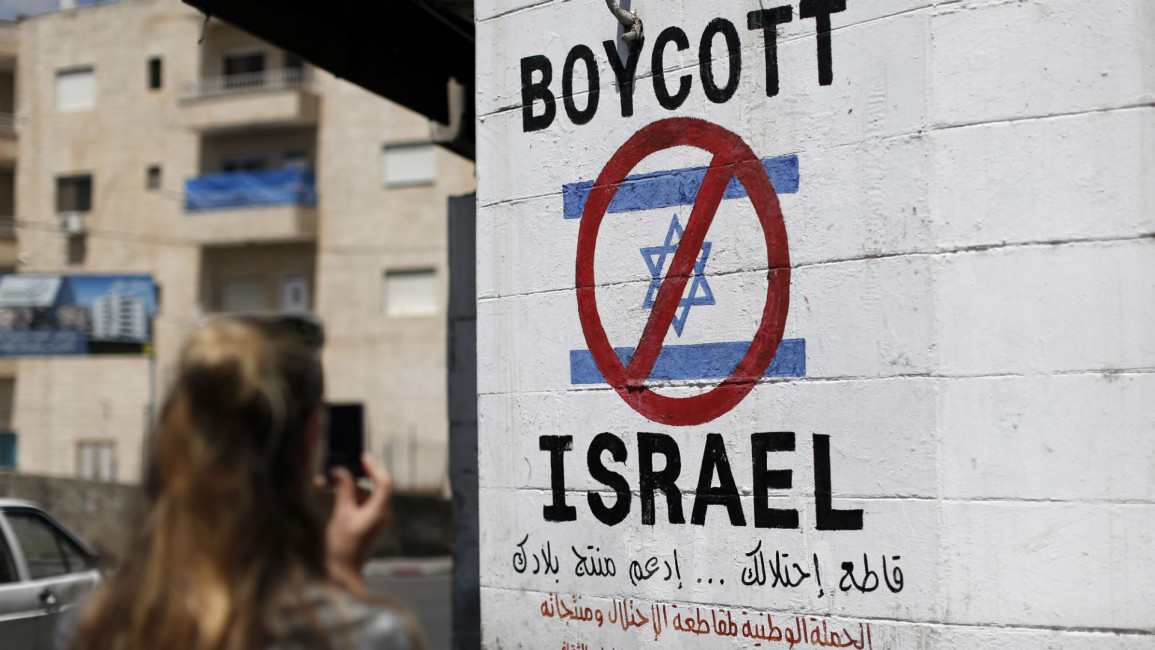
Israel intimidated by boycott threat to apartheid status quo
As Israeli politicians ramp up the rhetoric against the Boycott, Divestment, and Sanctions (BDS) campaign, two reports have suggested that much worse is in store for the movement which advocates economic and cultural disengagement from Israel.
First came a secret, Israeli government report obtained by business newspaper Calcalist. The internal document looked at the potential future impact of BDS on the country's economy - and the results are striking.
While avoiding full costings, according to the newspaper, "the blow to the economy has been characterised as devastating".
While the cancellation of trade agreements would lead to an estimated annual loss of $1.2 billion, even just an official boycott on goods from the occupied Palestinian territories "would shrink exports to Europe by $300 million".
The Ministry of Finance assessment, titled The Israeli economy is in the shadow of the delegitimisation campaign, predicts a worst-case scenario of "sanctions from EU countries and a widespread economic boycott" leading to a sharp fall in exports and capital inflow.
| A Rand Corporation study predicted a boost of more than $120 billion to the Israeli economy... in the event of a peace deal. |
The second, much more widely publicised report, came from the Rand Corporation, whose study predicted a boost of more than $120 billion to the Israeli economy over the next decade, in the event of a peace deal with the Palestinians.
However, Rand also considered the likely cost of BDS, foreseeing a two percent reduction in Israel's GDP, and estimating boycotts and other forms of "non-violent resistance" costing the Israeli economy billions of dollars over ten years.
The study's co-author was Charles Ries.
"Most of the impact [of BDS] would be on the capital account - forgone investment flows, changes in policies by pension funds and banks, rather than on trade," he told the Financial Times.
However, as Israeli economist Shir Hever has pointed out, neither report had access to the data that is needed in order to answer the question, "that is, data from Israeli companies about how much money they have lost due to BDS".
Both reports come at a time when Israelis are attempting to assess the impact of a growing international boycott campaign. Just this week, graduates at Tel Aviv University held a meeting on the academic boycott, while earlier this month, the heads of Israeli universities expressed concerns about "growing signs of an unofficial boycott".
Back in January, meanwhile, a conference was held in Tel Aviv to examine the impact of the cultural boycott on the art scene.
That same month, a separate Israeli government report was leaked to the media, anticipating that the country's deteriorating international position would further decline in 2015, with a growth in boycott campaigns.
The document warned of "moves to mark settlement products, stop the supply of replacement parts; debates on sanctions against Israel; demands for compensation for damage caused by Israel to European projects in the Palestinian territories; European activity in Area C, under Israeli rule; and more".
Some of this is already happening.
A year before, in January 2014, then-Finance Minister Yair Lapid warned of the consequences should the US-led "peace process" end in failure. Talks duly collapsed, and shortly afterwards, the world watched, appalled, as Israel laid waste to the blockaded Gaza Strip.
Lapid cited a finance ministry evaluation that an "even partial" European boycott would mean losses of billions of shekels.
At the time, the Wall Street Journal noted that "Israeli officials have been bracing for this possibility, but have mostly expressed their sentiments in private". Now the fears are well and truly out in the open.
The fact that the Israeli economy is, in many respects, in rude health, including strong trade relations with important markets around the world, has led some to condemn the Israeli government's focus on BDS as counter-productive scare-mongering.
But in terms of looking at the impact of BDS, some circumspection is in order.
| I can see the momentum gathering in the universities, and in the public opinion... - Ami Appelbaum |
As an Israeli executive said this week, while the export business is currently excellent, he is still anxious about the future.
"I worry because of the basic processes that are unfolding here," KLA-Tencor's Ami Appelbaum told Deutsche Welle. "I can see the momentum gathering in the universities, and in the public opinion, and that the understanding in the world of the justice of the Jewish cause - this is disappearing."
The BDS campaign has never been purely about economic impact; it is also about cultural, sporting, and academic isolation.
In other words, an assessment of the boycott campaign's influence to date, and its future potential, is not just about number-crunching - it's about the ways in which, as has already begun to happen, Israelis understand that a status quo of systematic discrimination, apartheid, and war crimes, is both unacceptable and unsustainable.
Ben White is a writer and analyst. Additional translation services provided to the author by Sol Salbe.
Opinions expressed in this article remain those of the author and do not necessarily represent those of al-Araby al-Jadeed, its editorial board or staff.




